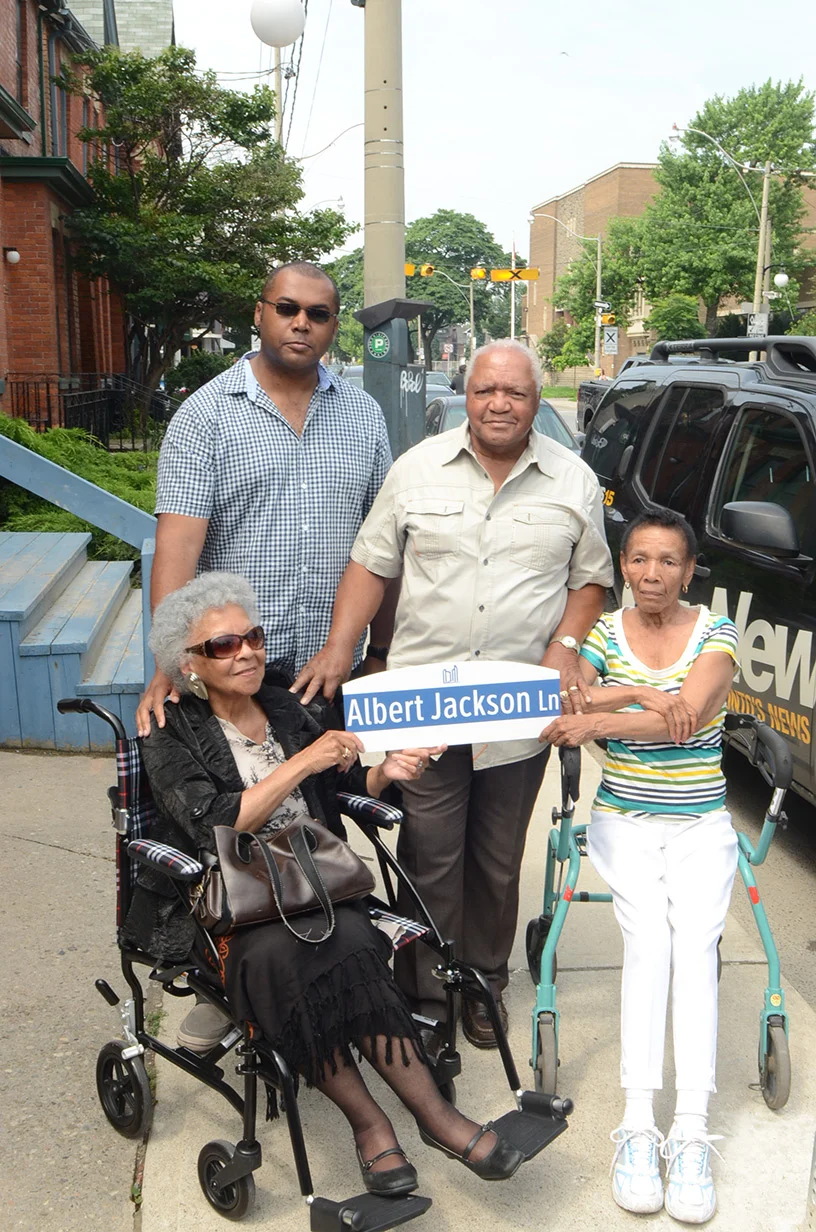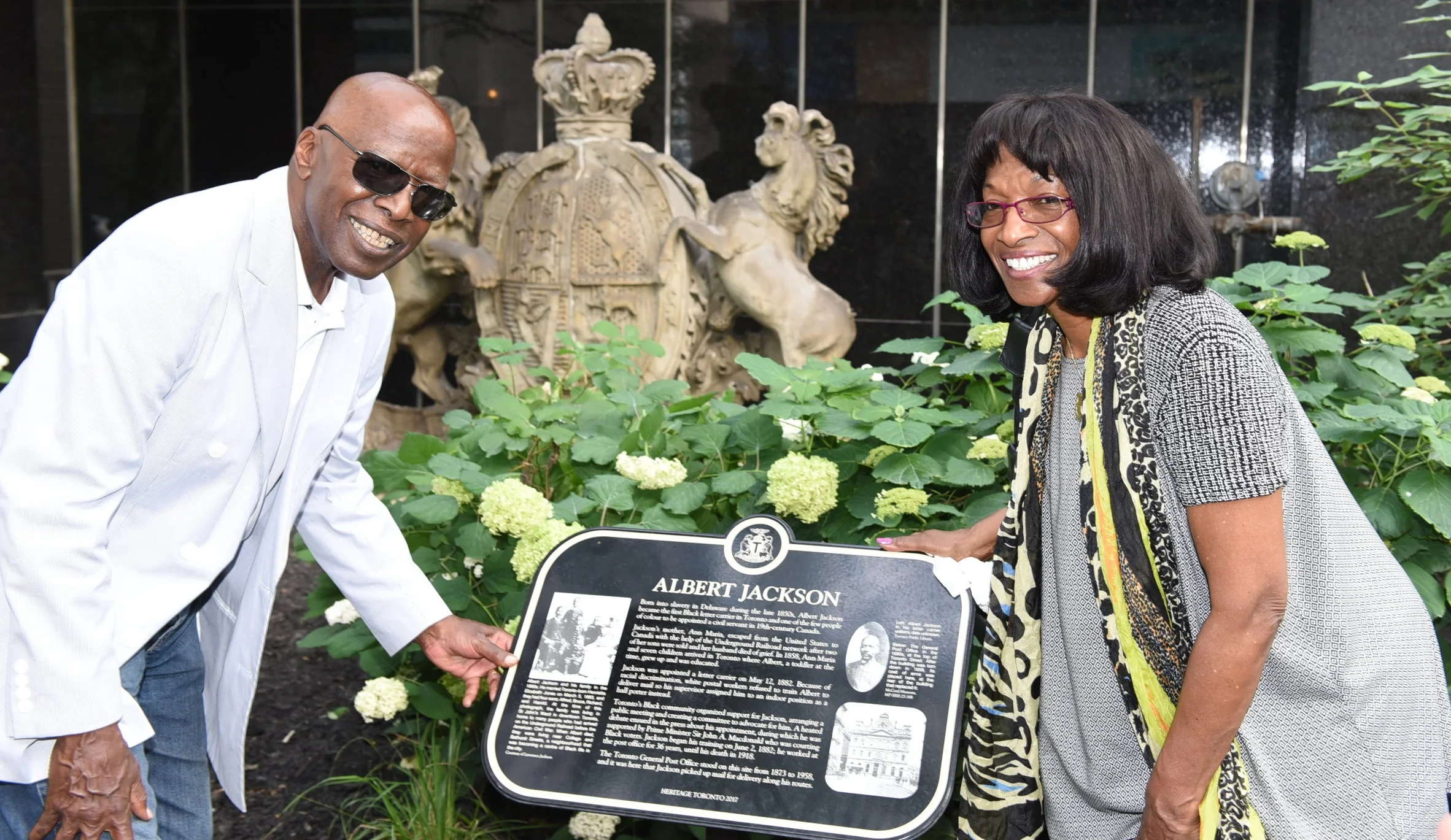Laneway honours Toronto’s first Black postman Albert Jackson
While in his Toronto home reading Dr. Karolyn Smardz Frost’s book, I’ve Got a Home in Glory Land: A Lost Tale of The Underground Railroad that he published, Patrick Crean stumbled upon the name Albert Jackson and the fact that he was the city’s first Black postman.
Crean later learned that the home he and his wife Susan Swan – a Canadian author – live in at 213 Brunswick Ave. was owned by the former child slave who came to Toronto through the Underground Railroad as a young boy with his mother and siblings.
Jackson bought the home in 1914, four years before he died and family members lived in it up until 1970.
When Crean got wind a few years ago that the Harbord Village Residents’ Association (HVRA) was seeking to attach names with a historical reference to 23 unnamed laneways in the Annex neighbourhood, he nominated Jackson’s name.
City council approved the suggestion and, last Saturday, family members and friends from across Canada and the United States gathered at a simple ceremony to unveil Albert Jackson Lane, located off Harbord St. between Brunswick Ave. and Borden St.
“His life has become an unexpected blessing and inspiration to me,” said Crean. “I think about him often and like to imagine he’s looking in on us as I sit in the house reading or contemplating the mystery of our lives. We often fail to remember heroic stories in this great country of ours. I think Albert Jackson embodied what this country is all about which is courage and persistence in the face of injustice, honourable behaviour and the rights of all citizens. He was an early pioneer in the struggle for a nation that holds pluralism and acceptance of all people as its highest virtue.”
When Jackson’s mother – Ann Maria Jackson who was an enslaved woman in Delaware – learned that her master intended to sell four more of her children (her eldest two had already being sold), she hurriedly gathered her remaining seven kids and embarked on the challenging journey to Canada. They arrived here in 1859 and the two children who were sold somehow found their way to Toronto where the family was united.
Albert, the youngest of the siblings, attended school and obtained employment as a mail carrier in 1882. When his White colleagues refused to train him, he was given a menial inside job as a hall porter.
A federal election was looming at around the same time and the postmaster, who was a close political ally of then Prime Minister Sir John A. MacDonald, promised to train the recruit in order to secure the nearly 60 Black votes in the Toronto Centre riding held by the Conservatives. The postmaster had earlier accused Liberal candidate J.D. Edgar of exploiting the situation to secure votes.
The ploy worked in favour of Jackson who spent the next 36 years until his retirement as a mailman.
Smardz Frost, the Bicentennial Visiting Professor for Canadian Studies at Yale University, applauded the efforts of those who worked hard to have the lane named after Toronto’s first postman of African descent.
“More places in our city need to commemorate the names of freedom seekers who have come and the thousands more who are still coming to Toronto today,” said the award-winning author, historian and archaeologist. “Such memorials not only celebrate their quest for liberty, but they also make us remember that the struggle for fairness and equal treatment does not end when people cross over the border into Canada. The First Nations peoples whose roots are so deep in this soil can certainly bear witness to that in light of the unending challenges they face with such courage and dignity.
“It is particularly fitting this commemoration is taking place during the week in which North Americans celebrate both Canada Day and American Independence Day. The life of Albert Jackson, the lives of his remarkable mother and his siblings who came to Canada and of his many descendants today demonstrate the myriad contributions made to the building of our city and our nation by men, women and children who left slavery behind in search of freedom.
“Albert Jackson and his family came to Canada for a better life. They stayed to make it a better place.”
A miniature sign of the new laneway bearing Albert Jackson’s name was presented to his grandchildren, Priscilla Walton, and Juney Brown and Lawrence Jackson.
“Today means everything to our family,” said Lawrence Jackson, the last living grandson who attended Huron St. Public and Central Technical schools. “This was home to me and many of our family members.”
To mark the historic occasion, great-great-grandson Jamaal Jackson Rogers wrote a poem, Legacy, and announced he was adopting his late mother’s – Joanne Lee Jackson – last name as his middle name.
“I was not given a second name at birth,” said the poet and hip-hop artist. “This is a major milestone for me as a man and it almost makes me feel complete.”
Past HVRA chair, Rory Sinclair, said a decision was made to name the laneways after a swarming incident on St. Patrick’s Day four years ago on Bathurst St. near Bloor St.
“In a meeting with representatives from Toronto Police, Toronto Fire and local businesses to look at ways of improving security, a fire official suggested that names should be given to the laneways because when they get calls for an incident in a laneway between two major streets, it’s not specific and in fact could be misleading,” said Sinclair. “In addition, there are laneways that are not contiguous, so you could go to the wrong one.”
He said the HVRA unanimously approved Crean’s recommendation.
“It was a no-brainer,” said Sinclair. “This is such a wonderful resident name to bring to this community and no one will walk by this lane ever again without thinking of who Albert Jackson was.”
This is the eighth laneway in the community to be named in the last year.
“To go to each one of the ceremonies for them and not only hear about the remarkable people who lived in this community and their contributions but also the hardships they faced coming from other places is remarkable,” said HVRA president, Tim Grant. “We are touched that so many of you have come today to celebrate and honour Albert Jackson and the contribution that he made to this community.”
Actress and singer Shawne Jackson and her brother Jay – they were members of the popular Majestics group that recorded several albums for the ARC Records label in the late 1960s – attended the event.
“Most of us were born on Brunswick Ave.,” said Jay Jackson, a great-grandson of Albert Jackson. “This is a special kind of rallying point for our family.”
Warren Phillips, a great-great-grandson, is extremely proud of his roots.
“We have had some history in this city and it’s important that we celebrate it,” he said. “It’s just a lane and that may seem insignificant to some people, but to our family this has a lot of meaning and we will cherish it always.”







